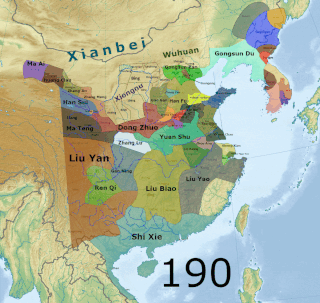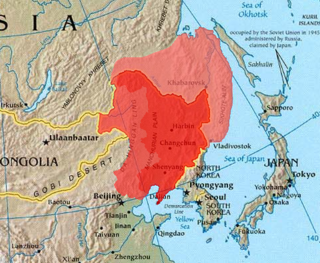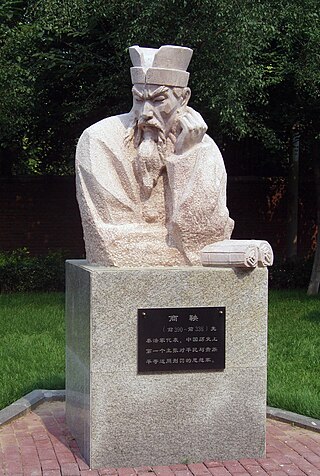
Hans Christian Andersen was a Danish author. Although a prolific writer of plays, travelogues, novels, and poems, he is best remembered for his literary fairy tales.

The Qing dynasty, officially the Great Qing, was a Manchu-led imperial dynasty of China and the last imperial dynasty in Chinese history. The dynasty, proclaimed in Shenyang in 1636, seized control of Beijing in 1644, traditionally considered the start of the dynasty's rule. The dynasty lasted until the Xinhai Revolution of October 1911 led to the abdication of the last emperor, February 12, 1912. In Chinese historiography, the Qing dynasty was preceded by the Ming dynasty and succeeded by the Republic of China. The multi-ethnic Qing dynasty assembled the territorial base for modern China. It was the largest imperial dynasty in the history of China and in 1790 the fourth-largest empire in world history in terms of territorial size. With over 426 million citizens in 1907, it was the most populous country in the world at the time.

The Three Kingdoms of Cao Wei, Shu Han, and Eastern Wu dominated China from 220 to 280 AD following the end of the Han dynasty. This period was preceded by the Eastern Han dynasty and followed by the Western Jin dynasty. Academically, the periodisation begins with the establishment of Cao Wei in 220 and ends with the conquest of Wu by Jin in 280. The period immediately preceding the Three Kingdoms, from 184 to 220, was marked by chaotic infighting among warlords across China as Han authority collapsed. The period from 220 to 263 was marked by a comparatively stable arrangement between Cao Wei, Shu Han, and Eastern Wu. This stability broke down with the conquest of Shu by Wei in 263, followed by the usurpation of Cao Wei by Jin in 266 and ultimately the conquest of Wu by Jin in 280.

The Han dynasty was an imperial dynasty of China established by Liu Bang and ruled by the House of Liu. The dynasty was preceded by the short-lived Qin dynasty (221–206 BC) and a warring interregnum known as the Chu–Han Contention (206–202 BC), and it was succeeded by the Three Kingdoms period (220–280 AD). The dynasty was briefly interrupted by the Xin dynasty (9–23 AD) established by the usurping regent Wang Mang, and is thus separated into two periods—the Western Han and the Eastern Han (25–220 AD). Spanning over four centuries, the Han dynasty is considered a golden age in Chinese history, and had a permanent impact on Chinese identity in later periods. The majority ethnic group of modern China refer to themselves as the "Han people" or "Han Chinese". The spoken Chinese and written Chinese are referred to respectively as the "Han language" and "Han characters".

Manchuria is a term that refers to a region in northeast Asia encompassing the entirety of present-day northeast China, and historically parts of the modern-day Russian Far East, often referred to as Outer Manchuria. Its definition may refer to varying geographical extents as follows: in the narrow sense, the area constituted by three Chinese provinces of Heilongjiang, Jilin, and Liaoning but broadly also including the eastern Inner Mongolian prefectures of Hulunbuir, Hinggan, Tongliao, and Chifeng, collectively known as Northeast China; in a broader sense, the area of historical Manchuria includes the aforementioned regions plus the Amur river basin, parts of which were ceded to the Russian Empire by the Manchu-led Qing dynasty during the Amur Annexation of 1858–1860. The parts of Manchuria ceded to Russia are collectively known as Outer Manchuria or Russian Manchuria, which include present-day Amur Oblast, Primorsky Krai, the Jewish Autonomous Oblast, the southern part of Khabarovsk Krai, and the eastern edge of Zabaykalsky Krai.

劉 / 刘 is an East Asian surname. pinyin: Liú in Mandarin Chinese, Lau4 in Cantonese. It is the family name of the Han dynasty emperors. The character 劉 originally meant 'battle axe', but is now used only as a surname. It is listed 252nd in the classic text Hundred Family Surnames. Today, it is the 4th most common surname in mainland China as well as one of the most common surnames in the world.
The Xiongnu were a tribal confederation of nomadic peoples who, according to ancient Chinese sources, inhabited the eastern Eurasian Steppe from the 3rd century BC to the late 1st century AD. Modu Chanyu, the supreme leader after 209 BC, founded the Xiongnu Empire.
The Manchus are a Tungusic East Asian ethnic group native to Manchuria in Northeast Asia. They are an officially recognized ethnic minority in China and the people from whom Manchuria derives its name. The Later Jin (1616–1636) and Qing (1636–1912) dynasties of China were established and ruled by the Manchus, who are descended from the Jurchen people who earlier established the Jin dynasty (1115–1234) in northern China. Manchus form the largest branch of the Tungusic peoples and are distributed throughout China, forming the fourth largest ethnic group in the country. They are found in 31 Chinese provincial regions. Among them, Liaoning has the largest population and Hebei, Heilongjiang, Jilin, Inner Mongolia and Beijing have over 100,000 Manchu residents. About half of the population live in Liaoning and one-fifth in Hebei. There are a number of Manchu autonomous counties in China, such as Xinbin, Xiuyan, Qinglong, Fengning, Yitong, Qingyuan, Weichang, Kuancheng, Benxi, Kuandian, Huanren, Fengcheng, Beizhen and over 300 Manchu towns and townships. Manchus are the largest minority group in China without an autonomous region.

Hans Florian Zimmer is a German film score composer and music producer. He has won two Oscars, four Grammys, and has been nominated for three Emmys and a Tony. Zimmer was also named on the list of Top 100 Living Geniuses, published by The Daily Telegraph in 2007.

Luoyang is a city located in the confluence area of the Luo River and the Yellow River in the west of Henan province, China. Governed as a prefecture-level city, it borders the provincial capital of Zhengzhou to the east, Pingdingshan to the southeast, Nanyang to the south, Sanmenxia to the west, Jiyuan to the north, and Jiaozuo to the northeast. As of December 31, 2018, Luoyang had a population of 6,888,500 inhabitants with 2,751,400 people living in the built-up area made of the city's five out of six urban districts and Yanshi District, now being conurbated. By the end of 2022, Luoyang Municipality had jurisdiction over 7 municipal districts, 7 counties and 1 development zone. The permanent population is 7.079 million.

Fajia, or the School of fa, often translated as Legalism, is a school of mainly Warring States period classical Chinese philosophy. Often interpreted in the West along realist lines, its members works contributed variously to the formation of the bureaucratic Chinese empire, and early elements of Daoism. The later Han takes Guan Zhong as forefather of the Fajia. Its more Legalistic figures include ministers Li Kui and Shang Yang, and more Daoistic figures Shen Buhai and philosopher Shen Dao, with the late Han Feizi drawing on both. Later centuries took Xun Kuang as a teacher of Han Fei and Li Si. Succeeding emperors and reformers often followed the templates set by Han Fei, Shen Buhai and Shang Yang, but the Qin to Tang were more characterized by their traditions.

The Chinese people, or simply Chinese, are people or ethnic groups identified with China, usually through ethnicity, nationality, citizenship, or other affiliation.
For most of its history, China was organized into various dynastic states under the rule of hereditary monarchs. Beginning with the establishment of dynastic rule by Yu the Great c. 2070 BC, and ending with the abdication of the Xuantong Emperor in AD 1912, Chinese historiography came to organize itself around the succession of monarchical dynasties. Besides those established by the dominant Han ethnic group or its spiritual Huaxia predecessors, dynasties throughout Chinese history were also founded by non-Han peoples.

The Book of the Later Han, also known as the History of the Later Han and by its Chinese name Hou Hanshu, is one of the Twenty-Four Histories and covers the history of the Han dynasty from 6 to 189 CE, a period known as the Later or Eastern Han. The book was compiled by Fan Ye and others in the 5th century during the Liu Song dynasty, using a number of earlier histories and documents as sources.

The Netherlands competed at the 1972 Summer Olympics in Munich, West Germany. 119 competitors, 90 men and 29 women, took part in 72 events in 16 sports.

Autonomous prefectures are one type of autonomous administrative divisions of China, existing at the prefectural level, with either ethnic minorities forming over 50% of the population or being the historic home of significant minorities. Autonomous prefectures are mostly majority Han Chinese by population. The official name of an autonomous prefecture includes the most significant minority in that region, sometimes two, rarely three. For example, a Kazakh prefecture may be called Kazak Zizhizhou. Like all other prefectural level divisions, autonomous prefectures are divided into county level divisions. There is one exception: Ili Kazak Autonomous Prefecture contains two prefectures of its own. Under the Constitution of the People's Republic of China, autonomous prefectures cannot be abolished.
Huizenga is a surname of Dutch origin. Notable people with the surname include:

The Groningen Student Rowing Club Aegir is a Dutch rowing club, founded 7 February 1878 as a subsidiary organization of Vindicat atque Polit, a Groningen Student Corporation. GSR Aegir is located at the Winschoterdiep, and, as of 2023 has approximately 900 members.

DeLand-Weldon High School is a coed public secondary institution located in Piatt County, Illinois. It is a part of DeLand-Weldon Community Unit School District #57. The school draws from an area of De Land and Weldon and is the fourth smallest public high schools in the state of Illinois with a total enrollment of 54 students.

Solo: A Star Wars Story is a 2018 American space Western film centering on the Star Wars character Han Solo. Directed by Ron Howard, produced by Lucasfilm, and distributed by Walt Disney Studios Motion Pictures, it is the second Star Wars anthology film, following Rogue One (2016). Alden Ehrenreich stars as Solo, with Woody Harrelson, Emilia Clarke, Donald Glover, Thandiwe Newton, Phoebe Waller-Bridge, Joonas Suotamo, and Paul Bettany. The film tells the origin story of Han Solo and Chewbacca, who join a heist within the criminal underworld ten years prior to the events of A New Hope.
















